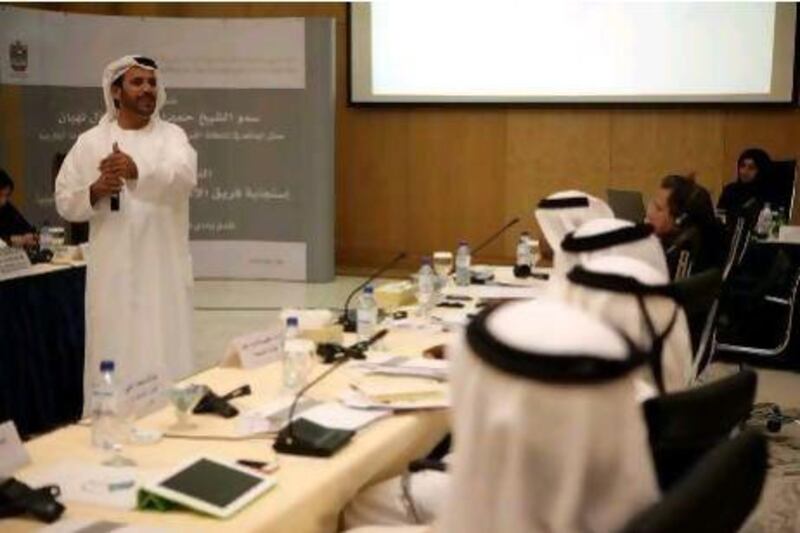ABU DHABI // Humanitarian organisations in the UAE say the tens of thousands of victims of the Syrian uprising should be their priority.
And they said they must work together for the aid to do the most good.
"There are a lot of injured people, mostly women and children, who need urgent help," Ateeq Al Mehairi, project manager at the Zayed bin Sultan Al Nahyan Charitable and Humanitarian Foundation, said yesterday. "We should do something given the urgent situation. We should see how we can relieve them or it would be too late to do something."
Mr Al Mehairi was speaking during a half-day workshop, called Lessons Learned Review: UAE Relief Team in Libya, at the Armed Forces Officers' Club in Abu Dhabi. The 2011 Libyan crisis, during which the UAE gave Dh248.5 million in assistance, is regarded as a milestone because of the unified response by the country's humanitarian actors.
Officials at the UAE Red Crescent Authority, who are already assisting Syrian refugees in Jordan and Lebanon, yesterday urged other organisations to join them.
"There is so much to do," said Ahmed Al Mazroui, chairman of the RCA. "We have sent letters and invited organisations. No one has replied to us. We can't force them to coordinate with us. Our doors are open. We have offices in Beirut and Amman."
The RCA is helping more than 50,000 refugees in Jordan and Lebanon with food, medicine and shelter - the only UAE organisation providing such aid to Syrian refugees.
"We encourage all humanitarian organisations, charity organisations in the UAE to work under our umbrella," Mr Al Mazroui said.
An official at the UAE Relief Team - a collaboration of four agencies that were assigned to deliver aid in Libya - said the organisation was prepared to step in at any time, but was waiting for government orders.
"If the Government says we should go, we are ready," said Abdul Rahman bin Abdul Aziz, the head of the team.
Yesterday's workshop was organised by the Office for the Coordination of the Foreign Aid to discuss the challenges and success of the Libyan mission. Agencies and members of the UAE Armed Forces, who provided medical and military support in Libya and other conflict zones, reviewed the response and the gaps in aid delivery.
"There is a shortage of doctors and nurses in the field," said Dr Abdulla Al Memari, a doctor with the relief team. "We should reach out to the Ministry of Health and other departments to support our cadres. We have a lot of missions and we cannot fulfil all these requirements at the same time."
Dr Al Memari also suggested recruiting doctors and paramedics from the country that is being helped, to limit language barriers.
The UAE Relief Team said it was important to avoid duplication.
"We have to give an olive branch to people in need. We have to join forces to work together ... the importance of cooperation between donor organisations cannot be emphasised enough," said Mr Abdul Aziz. "As our experience in Libya showed, a unified humanitarian response can help to ensure that those in need receive the best possible assistance."






